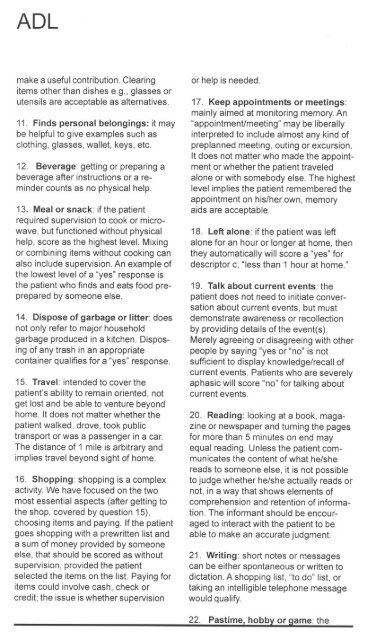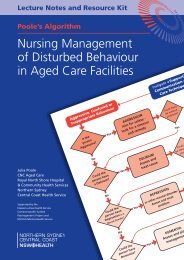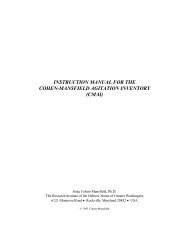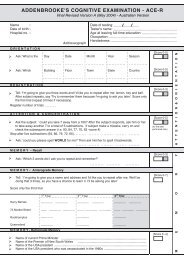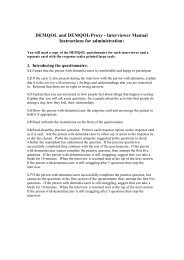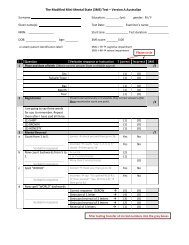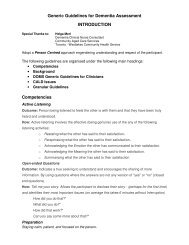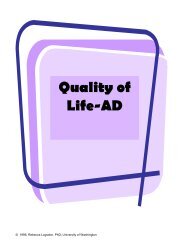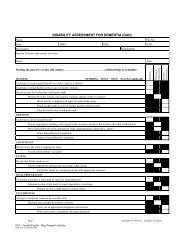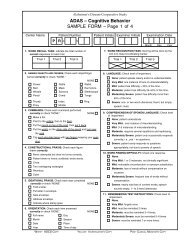ADCS-ADL Scale, Scoring and Manual - Dementia Outcomes ...
ADCS-ADL Scale, Scoring and Manual - Dementia Outcomes ...
ADCS-ADL Scale, Scoring and Manual - Dementia Outcomes ...
Create successful ePaper yourself
Turn your PDF publications into a flip-book with our unique Google optimized e-Paper software.
<strong>ADL</strong><br />
make a useful contribution. Clearing<br />
items other than dishes e.g., glasses or<br />
utensils are acceptable as alternatives.<br />
11. Finds personal belongings: it may<br />
be helpfulto give examplessuch as<br />
clothing,glasses,wallet, keys,etc.<br />
12. Beverage: gettingor preparinga<br />
beverageafter instructionsor a remindercounts<br />
as no physical help.<br />
13. Mealor snack: if the patient<br />
required supervision to cook or microwave,<br />
but functioned without physical<br />
help, score as the highest level. Mixing<br />
or combining items without cooking can<br />
also include supervision. An example of<br />
the lowest level of a "yes" response is<br />
the patient who finds <strong>and</strong> eats food preprepared<br />
by someone else.<br />
14. Dispose of garbage or litter: does<br />
not only refer to major household<br />
garbage produced in a kitchen. Disposing<br />
of any trash in an appropriate<br />
container qualifies for a "yes" response.<br />
15. Travel: intended to cover the<br />
patient's ability to remain oriented, not<br />
get lost <strong>and</strong> be able to venture beyond<br />
home. It does not matter whether the<br />
patient walked, drove, took public<br />
transport or was a passenger in a car.<br />
The distance of 1 mile is arbitrary <strong>and</strong><br />
implies travel beyond sight of home.<br />
16. Shopping: shopping is a complex<br />
activity. We have focused on the two<br />
most essential aspects (after getting to<br />
the shop, covered by question 15),<br />
choosing items <strong>and</strong> paying. If the patient<br />
goes shopping with a prewritten list <strong>and</strong><br />
a sum of money provided by someone<br />
else, that should be scored as without<br />
supervision, provided the patient<br />
selected the items on the list. Paying for<br />
items could involve cash, check or<br />
credit; the issue is whether supervision<br />
or help is needed.<br />
17. Keep appointments or meetings:<br />
mainly aimed at monitoring memory. An<br />
"appointment/meeting" may be liberally<br />
interpreted to include almost any kind of<br />
preplanned meeting, outing or excursion.<br />
It does not matter who made the appointment<br />
or whether the patient traveled<br />
alone or with somebody else. The highest<br />
level implies the patient remembered the<br />
appointment on his/her own, memory<br />
aids are acceptable.<br />
18. Left alone: if the patient was left<br />
alone for an hour or longer at home, then<br />
they automatically will score a "yes" for<br />
descriptor c, "less than 1 hour at home."<br />
19. Talk about current events: the<br />
patient does not need to initiate conversation<br />
about current events, but must<br />
demonstrate awareness or recollection<br />
by providing details of the event(s).<br />
Merely agreeing or disagreeing with other<br />
people by saying "yes or "no" is not<br />
sufficient to display knowledge/recall of<br />
current events. Patients who are severely<br />
aphasic will score "no" for talking about<br />
current events.<br />
20. Reading: looking at a book, magazine<br />
or newspaper <strong>and</strong> turning the pages<br />
for more than 5 minutes on end may<br />
equal reading. Unless the patient communicates<br />
the content of what he/she<br />
reads to someone else, it is not possible<br />
to judge whether he/she actually reads or<br />
not, in a way that shows elements of<br />
comprehension <strong>and</strong> retention of information.<br />
The informant should be encouraged<br />
to interact with the patient to be<br />
able to make an accurate judgment.<br />
21. Writing: short notes or messages<br />
can be either spontaneous or written to<br />
dictation. A shopping list, "to do" list, or<br />
taking an intelligible telephone message<br />
would qualify.<br />
22. Pastime, hobbl.2!.Same: the


